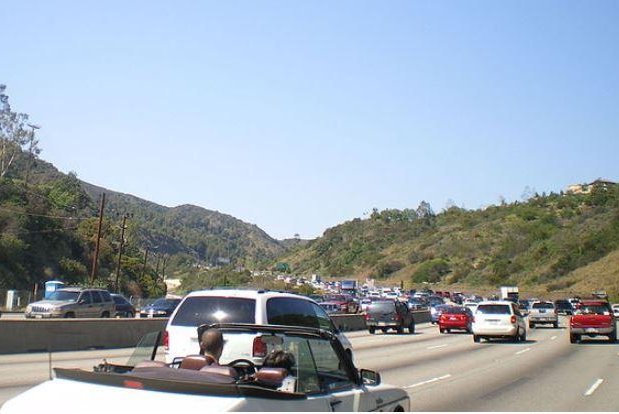Stretches of Interstate 405 in Southern California, which includes the Sepulveda Pass in San Monica, are among the most congested hotspots in the United States, according to INRIX, a global traffic consulting firm. Photo by
Cbl62/Wikimedia Commons
Sept. 27 (UPI) -- Los Angeles was ranked No. 1 for most congested metro area in the United States in a study conducted by INRIX, a global traffic consulting firm.
Los Angeles had the highest overall Impact Factor based on severity as well as the high number of hotspots -- 10,385 -- according to the report released Wednesday by the Kirkland, Wash.-based company. L.A. has 10 of the 24 worst hotspots in the United States.
NRIX analyzed and ranked more than 100,000 traffic hotspots in the 25 most congested U.S. cities In March and April from sensors on vehicles and motorists' cellphones.
The economic cost was also calculated in terms of wasted time, lost fuel and carbon emissions through 2026. In 25 cities, that amounts to $481 billion by 2026 and a total of almost $2.2 trillion over the next decade
L.A. also pays the highest price of $91 billion over the next 10 years if congestion doesn't improve, according to the report.
"Many cities are calling for increased transportation infrastructure spending to fix ailing roads, bridges and transit networks," said Bob Pishue, senior economist at INRIX. "By identifying traffic hotspots and analyzing their root causes, cities can effectively combat congestion and maximize present and future investments."
President Donald Trump has proposed $1 trillion to improve the nation's infrastructure.
Los Angeles' potential cost to drivers was 42 percent higher than the No. 2, New York, at $63.9 billion, and three times higher than Washington, D.C., at $29.2 billion. Atlanta was ranked fourth, Dallas fifth, with Chicago, San Francisco, Houston, Miami and Boston rounding out the top 10.
New York had more traffic hotspots -- 13,608 -- than any other city analyzed. Brooklyn Queens Expressway East at Exit 28A to West Shore Expressway was highest at No. 25, taking 64 minutes to travel the 4.37 miles on average.
The worst hotspot in terms of 2026 cost? The company ranked Washington, D.C., with the northwest stretch of the outer loop, between Baltimore National Pike in Catonsville and Providence Road in Towson. It took an average of 33 minutes to drive the 6.47-mile stretch with an impact of $2.3 billion.
Los Angeles has the second through fourth worst hotspots, led by Interstate 405 North at Exit 43 to Exit 21 with an average time of 23 minutes to travel the 5.12 miles. The 405 North at Exit 43 to Exit was second with a time of 23 miles to go 5.12 miles and third was U.S. 101 from Exit 3B to California 134/170, 3 hours, 55 minutes to go 4.22 miles.
The research group noted the Illinois Tollway's project on I-90 in Chicago is "proving successful at increasing speeds."















